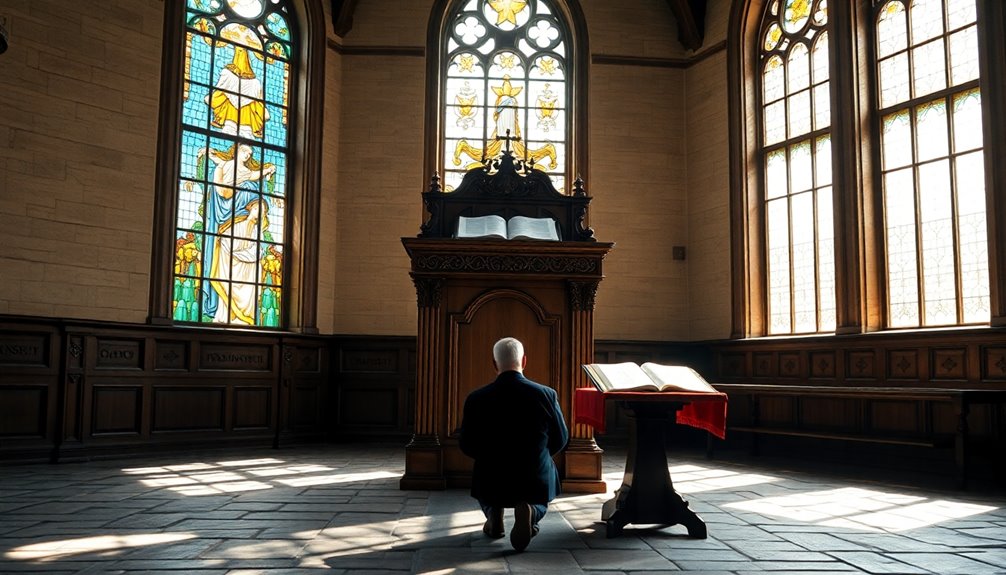Calvinist beliefs emphasize God's sovereignty and the principle of predestination, significantly shaping your understanding of faith and life. The doctrine is often summarized by the acronym TULIP, which stands for Total Depravity, Unconditional Election, Limited Atonement, Irresistible Grace, and Perseverance of the Saints. These tenets argue that humanity cannot seek God on its own, and that salvation is a divine choice, independent of human actions. While some worry this undermines moral responsibility, Calvinists maintain that the faithful are called to live with purpose and integrity. If you want to explore these ideas further, there's much more to uncover.
Key Takeaways
- Calvinism emphasizes God's sovereignty and predestination, asserting that salvation is determined by God's will rather than human actions.
- The TULIP acronym summarizes Calvinist beliefs: Total Depravity, Unconditional Election, Limited Atonement, Irresistible Grace, and Perseverance of the Saints.
- Total Depravity teaches that humanity cannot seek God due to original sin, necessitating divine intervention for salvation.
- Predestination is supported by biblical passages, notably Romans 8:29-30 and Ephesians 1:4-5, highlighting God's choice of the elect.
- Calvinism promotes a strong work ethic and social responsibility, viewing all work as a divine calling in service to God.
Introduction

Understanding Calvinist beliefs provides a fascinating glimpse into a significant branch of Protestantism shaped by John Calvin's teachings. At its core, Calvinism emphasizes God's Sovereignty and the concept of Predestination, asserting that God has a divine plan for humanity. This belief is encapsulated in the Five Points of Calvinism, often summarized by the acronym TULIP.
Total Depravity is the first point, highlighting humanity's inability to seek God due to original sin. From there, Unconditional Election follows, stating that God chooses those who'll be saved, independent of any actions or merits on their part.
This leads to Limited Atonement, which posits that Christ's death was specifically intended for the elect, rather than for everyone universally. Additionally, Calvinism includes Irresistible Grace, meaning that those chosen by God will inevitably come to faith through His grace, and Perseverance of the Saints, which reassures believers that the elect will maintain their faith until the end.
Together, these doctrines form a comprehensive framework that invites you to explore the depth and implications of Calvinist theology in your spiritual journey.
Biblical Basis for Predestination

When you explore the biblical basis for predestination, you'll find key passages that highlight God's sovereignty in choosing believers.
Romans 8:29-30 and Ephesians 1:4-5 are crucial references that underscore the idea of divine election.
These scriptures reinforce the belief that God's selection is based on His will, not human actions.
Primary Bible References
Often, the biblical basis for predestination is rooted in key passages that highlight God's sovereignty and purpose in salvation. Romans 8:29-30 emphasizes that God foreknew and predestined individuals to be conformed to the image of His Son, showcasing His sovereign choice in the doctrine of election. This underscores that predestination isn't a random act but a deliberate decision made by God.
Ephesians 1:4-5 further affirms that God chose believers in Christ before the foundation of the world, illustrating election's unconditional nature based solely on His will.
In 2 Timothy 1:9, we see that God saved and called individuals not according to their works but according to His own purpose and grace, reinforcing that salvation and damnation hinge on divine initiative rather than human merit.
Acts 13:48 indicates that "as many as were appointed to eternal life believed," linking God's predestining action directly to the belief of the elect.
Finally, Romans 9:11-13 highlights that God's purpose in election stands firm, as it's not based on works but on Him who calls, showcasing God's sovereignty in predestination within Reformed theology.
Secondary Bible References
Many passages in the New Testament provide a deeper insight into the doctrine of predestination, each reinforcing the idea that God's choice is central to salvation.
Romans 8:29-30 clearly illustrates this, stating that those whom God foreknew, He also predestined to be conformed to the image of His Son. This highlights God's sovereignty in the election of believers.
Ephesians 1:4-6 further emphasizes that believers were chosen in Christ before the foundation of the world, showcasing God's sovereign plan for election.
In 2 Timothy 1:9
Reformation-Era European Society

The Reformation unleashed a wave of transformation across 16th-century Europe, reshaping religious beliefs and societal structures. As you explore this era, you'll notice how Calvinism became a significant force, especially in Geneva, where the Reformed theologian John Calvin not only influenced theology but also the political landscape. His teachings emphasized the sovereignty of God, leading many to challenge the authority of the Roman Catholic Church and embrace a more personal interpretation of Scripture.
The rise of Protestant denominations, including Calvinism, sparked a shift in societal norms, promoting a strong work ethic and social responsibility. This cultural change encouraged the establishment of independent schools and universities, making education a priority for understanding Scripture and civic engagement.
The Synod of Dort further solidified these principles among Calvinists, reinforcing their beliefs amid increasing persecution.
As you delve deeper, you'll see how persecution of Calvinists, particularly the Huguenots in France, led to migrations and the establishment of thriving communities in the Netherlands, Scotland, and later North America. This migration not only shaped cultural landscapes but also set the stage for future societal developments rooted in Calvinist thought.
Calvin's View on Divine Sovereignty

At the heart of John Calvin's theology lies the profound concept of divine sovereignty, which asserts that God governs every facet of creation and human existence. Calvinists believe that this sovereignty is unconditional and comprehensive, meaning that nothing happens outside of God's control.
Central to this belief is the doctrine of predestination, where God unilaterally elects certain individuals for salvation, independent of any merit or actions on their part.
Calvin emphasized that God's sovereignty isn't just a distant oversight; it actively shapes every event in the world, including human choices. This perspective eliminates any notion of chance, reinforcing that everything serves God's ultimate purpose. You'll find that Calvinists believe God's providence ensures that every detail aligns with His divine will.
In matters of salvation, Calvin argued that God's grace irresistibly leads the elect to faith and repentance. This idea underscores how divine sovereignty permeates not only personal salvation but also the governance of the church, which operates under God's authority rather than human will.
Understanding Calvin's view on divine sovereignty enriches your appreciation of the intricate relationship between God and creation in Reformed theology.
Predestination and Free Will Confusion

You might find it confusing when trying to reconcile the concept of predestination with the idea of free will.
Many misconceptions surround these doctrines, especially regarding how they impact moral responsibility.
Understanding these nuances can clarify how Calvinist beliefs shape our views on salvation and human agency.
Debunk Common Misconceptions
Misunderstandings about Calvinism often lead people to believe it denies free will altogether. In reality, Calvinism teaches that while human will is bound by sin, as outlined in the doctrine of Total Depravity, individuals still possess the ability to make genuine choices. However, these choices are significantly influenced by sin and God's Sovereignty.
Calvinists emphasize that God's election is unconditional, not based on foreseen merit or faith. This debunks the misconception that foreknowledge dictates who gets saved.
When it comes to double predestination, people often confuse it with fatalism. Calvinists clarify that while God predestines some for salvation, He doesn't actively cause individuals to sin, thereby respecting human responsibility.
The concept of "irresistible grace" often raises eyebrows as well. It doesn't imply coercion; instead, it signifies that God's grace transforms the hearts of the elect, enabling them to respond willingly to Him in faith.
Moral Implications of Predestination
The doctrine of predestination raises significant moral questions, particularly regarding how individuals perceive their choices and responsibilities. In the context of God's sovereignty, many grapple with the idea that if God has already chosen the elect for salvation, what does that mean for moral responsibility?
Critics of predestination argue that this belief can lead to moral complacency. If you think your actions are predetermined, it might diminish your sense of urgency about engaging in ethical behavior.
However, Reformed churches emphasize that while God does predestine, you still possess the ability to make choices. Your moral actions serve as evidence of being among the elect. This creates a complex relationship between predestination and free will, prompting extensive theological debates.
Some theologians stress God's sovereignty, while others advocate for a more synergistic view that allows for human agency in salvation.
Ultimately, the confusion surrounding predestination can lead to misconceptions about Calvinism. It's crucial to recognize that the doctrine doesn't encourage fatalism; instead, it challenges you to pursue a life marked by moral diligence and responsibility, reflecting your commitment to a faith that actively engages with the world.
Faith in Daily Decisions

In your daily choices, you're reflecting your beliefs and values, which is central to Calvinism.
Leaning on your congregational support systems can guide you in making decisions that honor God and your community.
As you navigate life, remember that each choice is an opportunity to express your faith.
Daily Choices Reflect Beliefs
Throughout your daily life, the choices you make can reveal the depth of your faith and understanding of God's sovereignty. Calvinism teaches that every decision, no matter how small, should align with divine will and purpose. When you make moral and ethical decisions, you're not just acting on your own; you're demonstrating your election and commitment to live out your faith.
The concept of Total Depravity reminds you that, without divine intervention, your choices are inherently sinful. This understanding emphasizes the need for reliance on God's guidance and strength in every situation.
By embracing the doctrine of Irresistible Grace, you acknowledge that God's grace influences your daily choices, steering you toward actions that reflect His teachings.
Engaging in diligent work and social responsibility showcases your commitment to faith. The Protestant work ethic encourages you to contribute positively to society, making your daily choices a testament to your beliefs.
Ultimately, each decision you make serves as a reflection of your faith, revealing how deeply you understand and trust in God's sovereignty in your life.
Congregational Support Systems
Congregational support systems consistently play a vital role in helping you navigate daily decisions through the lens of your faith. In Calvinism, these systems emphasize the importance of community and accountability, encouraging you to seek guidance from Scripture and church members when facing moral dilemmas. This collective approach reinforces the belief that your choices should align with God's sovereignty.
Many congregations offer valuable resources, like counseling and small groups, designed to help you tackle personal challenges and apply your faith to everyday situations. The concept of vocation further enriches this support, reminding you that all work—whether secular or sacred—serves as a calling from God. With this perspective, you can approach your daily tasks with purpose and divine intention.
Additionally, mentorship programs and educational initiatives within your community foster spiritual growth, equipping you to make decisions that reflect your faith commitments. Engaging with these congregational support systems not only strengthens your resolve but also deepens your understanding of how to integrate your beliefs into daily choices.
Ultimately, these systems empower you to live out your faith with confidence and clarity.
Final Thoughts on Predestination

While many find the concept of predestination challenging, it's essential to recognize its profound implications in Calvinist theology. Predestination asserts that God's sovereignty governs salvation, as He unconditionally elects certain individuals for salvation while others face damnation. This is where the doctrine of double predestination comes into play, distinguishing between God's active decree to save the elect and His passive foreordination of the reprobate.
The Reformed confessions, particularly the Westminster Confession of Faith, articulate this belief, providing a robust theological framework that has shaped Reformed thought for centuries. Key biblical references, like Romans 8:29-30, support this view by outlining the chain of salvation, from foreknowledge to glorification, further emphasizing God's election.
For Calvinists, the assurance of salvation hinges on the perseverance of the saints, meaning that the elect will remain steadfast in faith because of God's unwavering grace. This perspective invites you to reflect on the complexities of divine judgment and the deep sense of security that comes from understanding God's sovereignty in your own salvation journey.
Ultimately, predestination offers a profound assurance of God's purposeful plan for believers.
Additional Resources

To deepen your understanding of Calvinist beliefs, especially regarding predestination, several valuable resources are available. One foundational text is the Westminster Confession of Faith, which clearly articulates the principles of predestination and God's sovereignty. This document serves as a cornerstone for many who study Calvinism.
You might also explore "The Cambridge Companion to Reformed Theology," which offers scholarly perspectives on Calvinism, including its historical context and theological implications related to predestination. Works by Theodore Beza, Loraine Boettner, and B. B. Warfield provide thorough overviews of Calvinist principles, highlighting the distinctions between Calvinist predestination and fatalism.
Additionally, R. C. Sproul's writings critique the concept of equal ultimacy within Calvinism, emphasizing the nuances of divine decrees concerning election and reprobation.
For a broader understanding, Veldman's studies on Protestantism and the arts delve into the social and cultural impacts of Calvinism. By engaging with these resources, you can gain a richer appreciation for the complexities and depth of Calvinist beliefs surrounding predestination and God's sovereignty.
Frequently Asked Questions
What Is the Basic Beliefs of Calvinism?
When you explore the basic beliefs of a particular theological framework, you'll find key principles guiding its followers.
These include the idea that humanity can't save itself due to inherent sinfulness, and that certain individuals are chosen for salvation based on divine will rather than personal merit.
Additionally, there's a belief in a specific atonement for those chosen, and that God's grace effectively draws them to faith, making it irresistible.
What Are the 5 Main Points of Calvinism?
You've probably heard of five main points that summarize a specific theological perspective.
First, total depravity highlights human inability to save themselves.
Next, unconditional election emphasizes that God chooses individuals for salvation based solely on His will.
Limited atonement suggests Christ's sacrifice is effective only for the elect.
Irresistible grace means that those chosen will inevitably come to faith.
Finally, perseverance of the saints assures that the elect will remain faithful until the end.
What Is Not Allowed in Calvinism?
In Calvinism, you can't embrace the idea of universal salvation, as it rejects the notion that everyone will be saved.
You also won't find acceptance for free will in choosing God, since it's believed that divine intervention is necessary for salvation.
Any belief that salvation depends on human merit or simple acknowledgment of faith isn't allowed.
Lastly, you won't encounter support for Arminianism, which emphasizes conditional election and resisting grace.
What Do Calvinists Believe About Jesus?
You'll find that believers view Jesus as both fully divine and fully human, the Son of God who offers salvation through His life, death, and resurrection.
They believe His sacrificial death was specifically for the elect, ensuring their salvation. Jesus acts as the Mediator, interceding for them before God.
His resurrection is crucial, guaranteeing not just eternal life for believers, but also their future resurrection.
Ultimately, faith in Him is seen as a divine gift.










